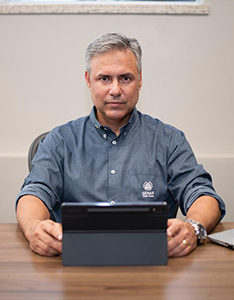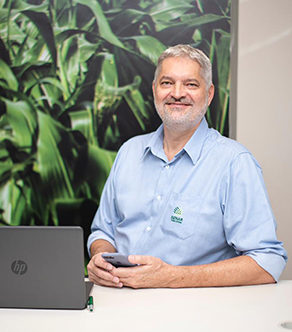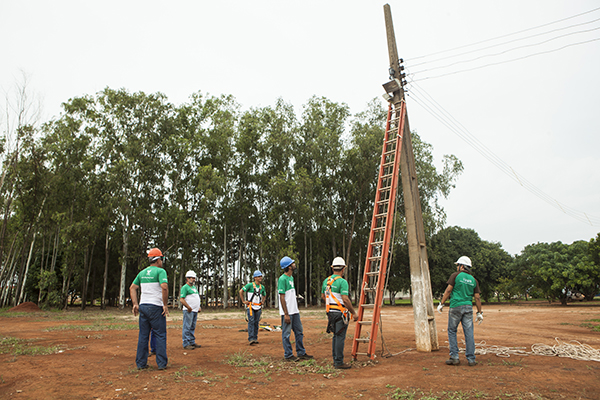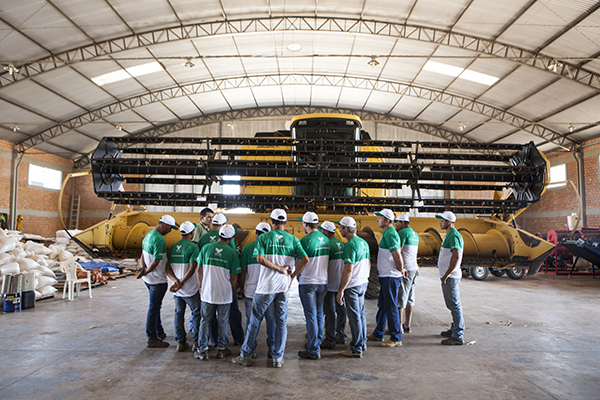Brazilian agriculture is becoming more modern and professional, and farm workers are key to this transformation.
However, there is a lack of qualified labor, hence the importance of entities such as SENAR – National Rural Learning Service, which promotes training of rural workers.

Francisco Olavo Pugliesi de Castro, Superintendent of Senar-MT

Carlos Augusto Zanata, Operation Director of SENAR MT
AgriBrasilis interviewed two representatives of Mato Grosso State’s SENAR (SENAR MT): Francisco Castro, popularly known as Chico da Paulicéia, veterinarian, livestock and Pure Nelore cattle breeder in addition to vice-president of the Agriculture and livestock Federation of Mato Grosso (Famato); and Carlos Zanata, Operation Director of SENAR MT, veterinarian, with experience in leadership roles in Famato, Milk Producers Association.
AgriBrasilis – What is the outlook of training for farm workers?
Senar MT – Qualified labor was always a gap for farmers, not only in Mato Grosso State, but in Brazil as a whole. Senar’s role is to bring training and knowledge to rural workers. We offer more than 350 courses, technical and management assistance and at least 15 special programs. In this manner, we meet the needs of professional of all levels of education and qualification.
AgriBrasilis – What is the importance of training farm workers?
Senar MT – Qualified and trained professionals are essential for the quality of production. More than that, they contribute to raise profitability and prosperity for the farms, after all, the greatest share of costs of management and the quality of products are related to the activities performed by them.
A trained professional will use 100% of what is offered by the equipment and machinery, once the changes in embedded technology are dynamic, the more qualified and skilled, the greater the use of agricultural machinery and implements used on the property.
In addition, when farmers invest in training, people turnover decrease, and wages increase.
AgriBrasilis – Is it a challenge for employers to find qualified workers?
Senar MT –The connection between worker and employer is another gap in the sector. To meet this demand, Senar MT created a program called Talent Harvest, which aims to connect employers and workers. The platform already has around 150 thousand CVs in such a way farmers and companies may have access to qualified professionals. On the other side is Senar MT, with the CVs of people trained by the institution.
AgriBrasilis – Does Senar MT take into account actions to train older workers in new technologies?
Senar MT – Yes, we do. We have several programs and projects that aim at the inclusion of workers in all links of the production chain. One of the most popular is Digital Inclusion, which shows to participants how to use a computer, and basic functions such as spreadsheets, text and slides.

AgriBrasilis – What courses are the most sought?
Senar MT – The ones of Regulatory Standards (NRs) which include all related to health and safety at work, those related to agricultural machinery and implements and those related to brucellosis vaccination.
Agribrsilis – How many workers does Senar MT train per year?
Senar MT – In 2019, before pandemic, we performed 6,191 educational actions, 4,798 of which of Professional Agricultural Training and 1,393 of Social Promotion.
Training – 40 thousand people were trained and 55 thousand trainings happened, meaning some people attended more than one course at Senar MT that year.
Service – We also have projects that offer services to farmers. In 2019 we performed 155 thousand services to more than 80 thousand people.
Mechanization – this is one of the most sought courses. In 2019 we performed 794 courses and trained around 9 thousand people.
AgriBrasilis – Did pandemic bring difficulties in training?
Senar MT – It did. We respected all State and municipality decrees stopping activities when needed. Until 2019 the average number of people served ranged from 70 to 80 thousand. In 2020 this number dropped to around 40 thousand people.

